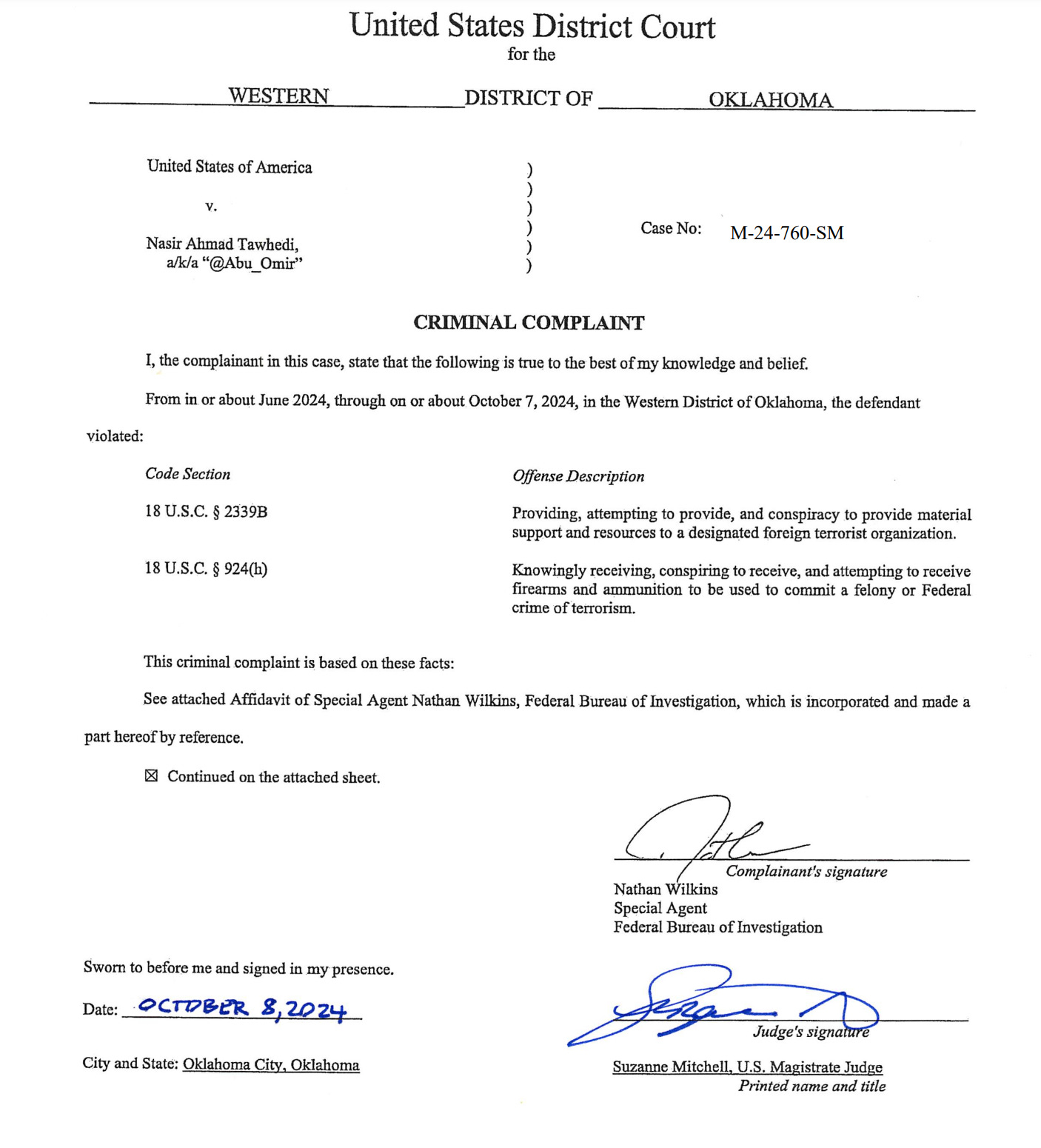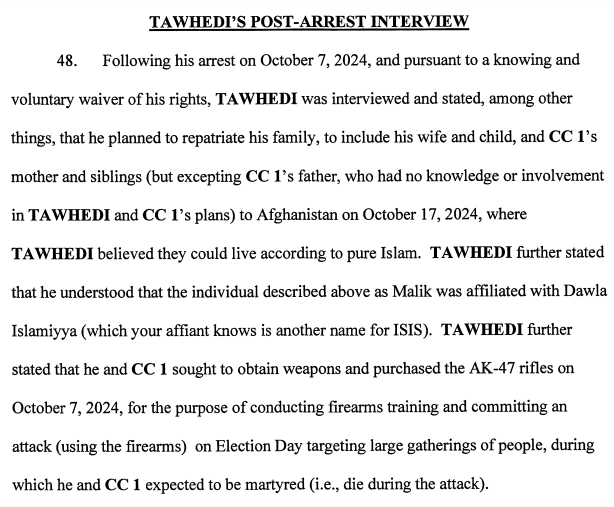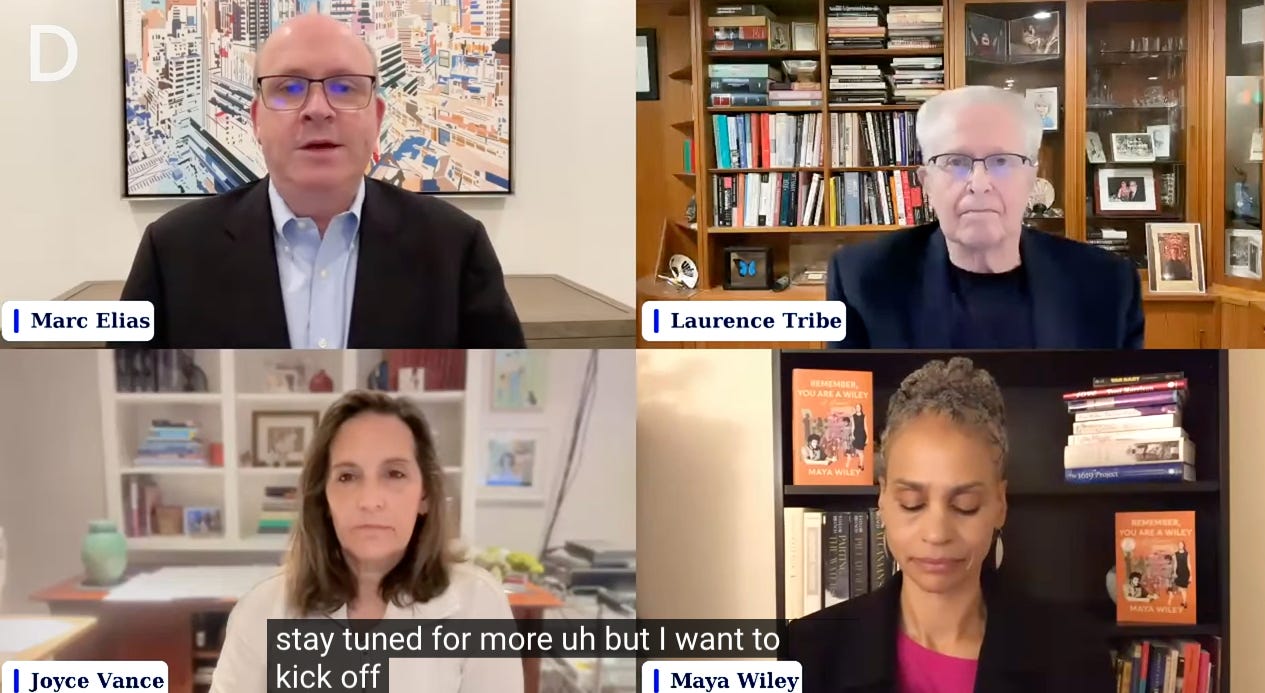On Tuesday, DOJ charged a 27-year-old Afghani national with a terrorist plot to disrupt election day. Nasir Ahmad Tawhedi was arrested and charged in a complaint with conspiring and attempting to provide material support to ISIS. The material support crime, found at 18 U.S.C. § 2339B, makes it a crime to knowingly provide material support to a foreign terrorist organization such as ISIS and carries a maximum prison sentence of 20 years. Tawhedi is also charged with receiving a firearm he knew would be used to commit a felony or a federal crime of terrorism, which carries a maximum sentence of 15 years under 18 U.S.C. § 924(h).
When announcing a case, prosecutors are very limited in what they can say publicly—they cannot go beyond what is contained “in the four corners” of the charging document. But that limited version of the government’s evidence makes clear that this had the potential to become a very serious situation.
Tawhedi was charged in the Western District of Oklahoma, which includes Oklahoma City, an eerie resonance to the act of domestic terror there in 1995 when Timothy McVeigh bombed the Murrah Federal Building, killing 168 people, including 19 children.
From the complaint and the accompanying affidavit, it appears that Tawhedi was on the FBI’s radar screen early on. This is not surprising. FBI Director Chris Wray called international terrorism the FBI’s top priority when the charges were announced, and they put significant resources into coordination with other federal, state, and local partners so that they are constantly evaluating new and emerging threats. When Tawhedi began selling off his family’s possessions on Facebook, they were able to put what they refer to as an “FBI asset” in place to purchase them, dropping the fact that he owned a gun store. Tawhedi expressed interest in purchasing two AK-47 assault rifles, magazines, and ammunition. Ultimately, he and a juvenile accomplice met with this person and purchased two AK-47 assault rifles, ten magazines, and 500 rounds of ammunition. The arrest took place at that point.
Tawhedi took significant steps towards executing his plan, including making plans to resettle his and his accomplice’s families overseas in advance.
Handling a situation like this requires a deliberate balance. Law enforcement likes to shut these situations down as “far left of boom,” meaning before the crime is actually committed, as possible. The risk is that the wrongdoer might walk away free if you don’t calibrate the investigation and the point at which you take it down just right. If agents don’t let the would-be terrorist go far enough along toward executing his scheme to demonstrate clear intent, prosecutors may not have sufficient evidence to prosecute and convict. There is a risk that a truly malicious actor would be freed to try again. But, of course, the further you let that person progress towards committing the crime, the greater the risk to the community. There is always the possibility that they could go rogue and deal with sources of weaponry other than the carefully arranged FBI contacts. It’s that unpredictable conduct that keeps agents up at night during a case like this, and the FBI would have done its best to keep eyes on Tawhedi and the accomplice at all times.
The FBI was also able to seize Tawhedi’s phone and obtain his communications. They learned that Tawhedi was planning an attack for Election Day. He was interviewed after his arrest and confirmed that timing, telling agents that the attack was intended for “large gatherings of people.” It was a suicide attack—Tawhedi said both he and the juvenile “expected to die as martyrs.”
It’s a serious matter when a plan like this is uncovered. Of course the obvious risk is that there are more in the works. The FBI will run all of its traps and traces nationwide to uncover anything additional. There is reporting from NBC tonight that Tawhedi worked as a security guard for the CIA in Afghanistan and came to the U.S. on what’s called “humanitarian parole” just after the U.S. withdrawal from that country. Inevitably, politicians like Trump will try to use this to score points. In reality, it is a cautionary tale about the difficult path we must walk in challenging international circumstances where we try to navigate our own security concerns amidst a humanitarian crisis. Investigators will try to determine when and How Tawhedi was radicalized, whether it was before or after he came to this country, and evaluate whether there are additional risks.
In 2012, while I was a U.S. Attorney, my office prosecuted the first material support of terrorism case in North Alabama. The defendant was an Uzbek national who overstayed a student visa and was radicalized online. He was sentenced to almost 16 years in prison for providing material support to terrorism, threatening to kill President Barack Obama, and illegally possessing a weapon. The threat unfolded rapidly. All of the federal law enforcement agencies, all of our state and local partners, and the prosecutors involved came together seamlessly with little warning to run an operation similar to the one used to ascertain whether Tawhedi posed a real threat. What stands out to me in hindsight from that intense time is that there were no questions about what the mission was. Every agent and every prosecutor was singularly committed to one goal—protecting American lives. In an era where Donald Trump frequently calls for the FBI’s dissolution, they have proven again this week, as they have over and over, how important it is to have committed career law enforcement agents and prosecutors protecting the American people. This is about national security, and the case shouldn’t, although it likely will, become a political football.
You can read the full complaint and affidavit here. If you want a more detailed explanation of the material support crime, the Congressional Research Service has an excellent layout of the elements of the crime and what it takes to prove them here. As the case progresses, we’ll likely have the opportunity to look at the law more closely, although many of these cases, and especially here where there seems to be at least a partial confession, resolve with a guilty plea (so long as all of the evidence is admissible at trial against the defendant).
There are lots of concerns as we head into this election. The important thing is to not let them paralyze you. Don’t let anyone tell you your vote doesn’t matter—there wouldn’t be forces trying so hard to keep you from voting if it didn’t. Your votes down ballot in the local and statewide races matter as much as the national ones, and your vote is uniquely powerful in that space. Even if you aren’t in a battleground state, your vote may determine the balance in the House or the Senate, and your governor, state legislator, or even your mayor may impact abortion rights, how migrants are treated where you live, climate change preparation, or any number of important issues. So register, vote, make sure your vote gets counted, and do your best to involve everyone around you in the process. It’s sadly realistic to be concerned about threats to the election this cycle. Let’s vote for people who will work hard to make it easier for eligible citizens to vote and ensure their votes are counted properly in the next cycle.
Let me know if there are any particular concerns or questions on your mind, and I’ll do my best to answer them in the comments.
Friday night, we’ll take up concerns about voter intimidation and what’s being done about it. And for those of you who missed Marc Elias’ Democracy Docket program on election concerns with Maya Wiley, Professor Laurence Tribe, and me last night, it’s available on YouTube here. Knowledge is the best antidote for the disinformation and fear that’s being spread in advance of this election. There are a lot of people who care about democracy. Our voices and votes, in combination, will get us through this.
We’re in this together,
Joyce







I voted today for democracy. I hand delivered my ballot too! First time I've ever voted feeling trepidation. I think that's the correct word. So proud of Harris/Walz. Am in Florida so it seems so much more important.
OMG, will we ever get past all the election issues? The Georgia Election Board has gone nuts! Threatening terroristic acts is an additional issue! Election deniers all over our country! What the hell else?